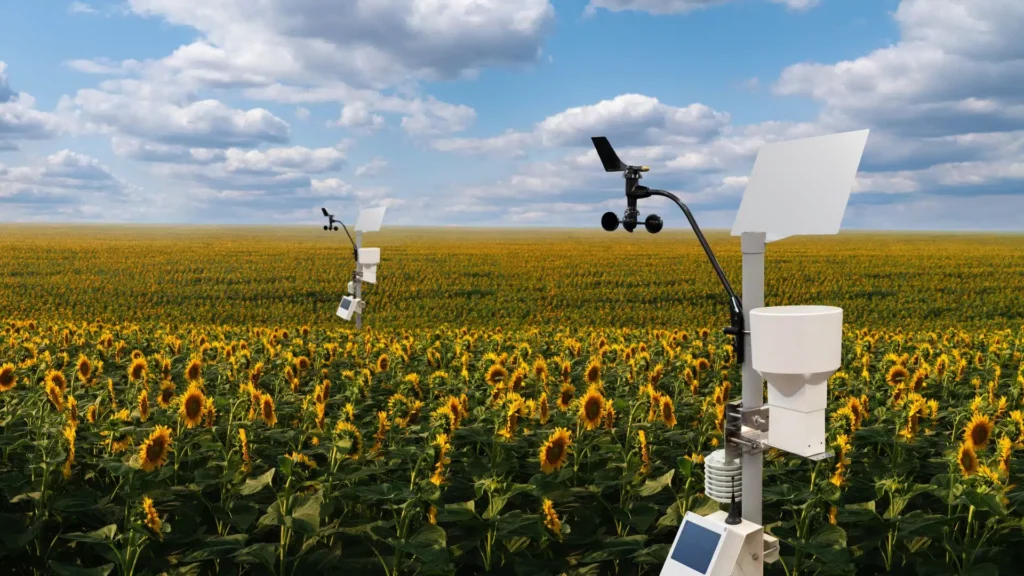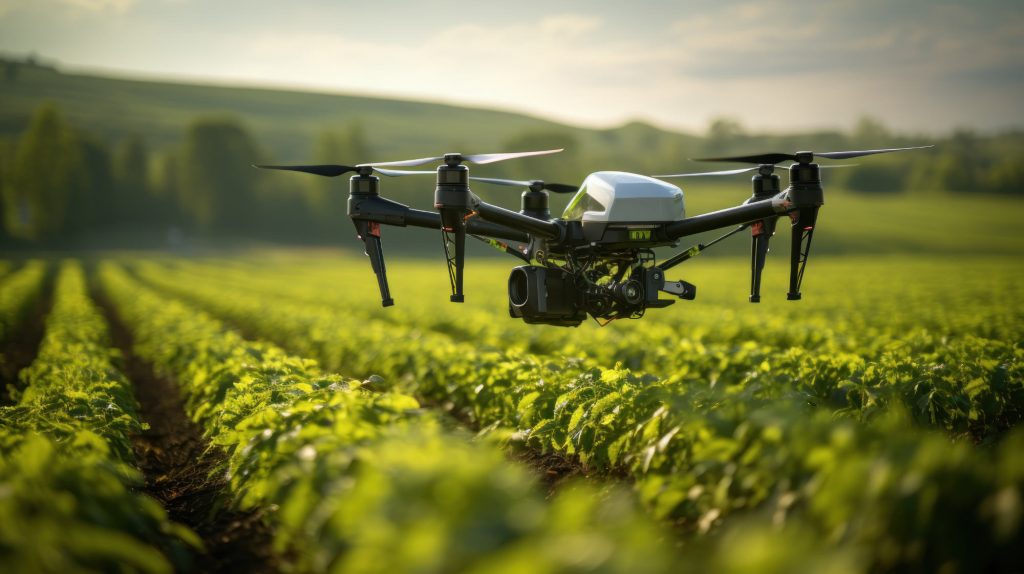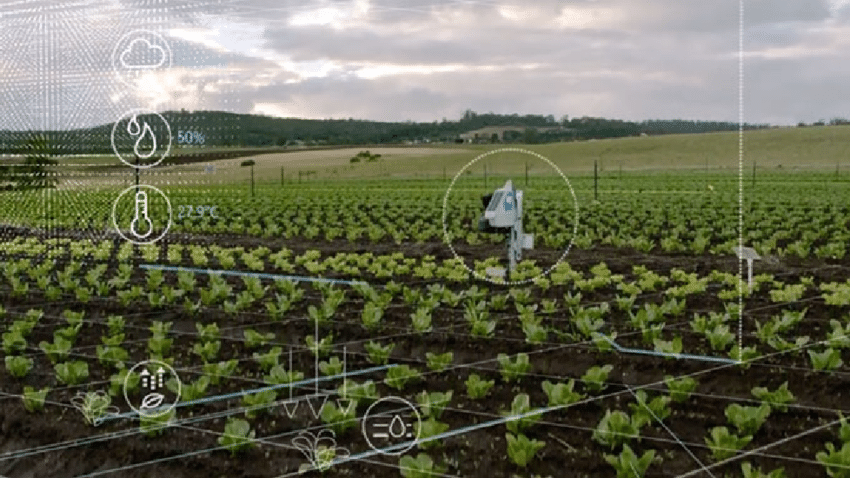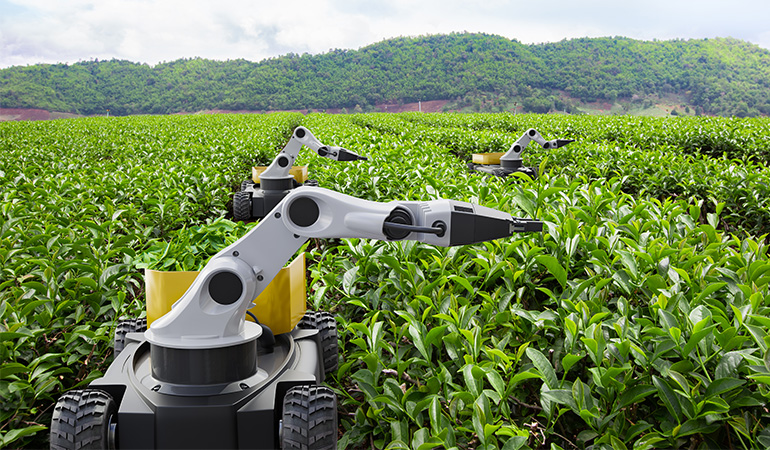Farming used to mean waking up at dawn, sweating under the sun, battling bugs, and hoping for a decent harvest. But hold up thanks to AI in agriculture technology, things are changing fast. technology just rolled into the barn with some serious swag: Artificial Intelligence (AI). Now farmers aren’t just working hard, they’re working smart. Like, “Hey robot, can you do this?” smart.
Here’s a fun and detailed look at how AI is turning farming into a high-tech game changer.
Why AI in Agriculture? Because Farming Deserves a Glow-Up
If you think farming is just about planting seeds and hoping for rain, think again. The world’s population is growing, food demand is rising, and climate change is throwing curveballs no farmer asked for.
This is where AI steps in as the superhero of modern farming. It helps increase yields, reduce waste, and make farming less guesswork and more data-driven science.
So buckle up, because farming is officially going high-tech!
Weather Forecasting That’s Trustworthy
Remember when you’d look outside, think, “Hmm, will it rain today?” and then get soaked anyway? Those days are fading. AI uses satellite images, sensor data, and weather history to predict rain, droughts, and even micro-weather changes.
It’s like having a super-smart weather app that whispers, “Plant those tomatoes tomorrow, not today,” saving farmers from soggy disasters or parched fields.
How does it work?

AI models analyze gigabytes of data past weather records, current atmospheric conditions, satellite images, and soil moisture sensors to predict weather patterns specific to a farm’s location.
For example, IBM’s The Weather Company uses AI-powered forecasting for agriculture that helps farmers plan irrigation and harvesting with higher precision.
Why farmers love it:
No more guessing games! Knowing exact weather forecasts helps farmers decide when to plant, water, or harvest, reducing crop losses from unexpected weather changes.
Plus, fewer crop failures mean fewer heartbreaks, and that’s priceless.
Pest Patrol: AI vs. The Bug Squad
Pests are the uninvited guests who crash the farming party and ruin everything. But AI drones and cameras are now acting like farm security guards.
These gadgets scan the crops, snap photos, and send them to AI systems that analyze if leaves have suspicious spots or holes, signs of pests or diseases. It’s like having Sherlock Holmes on the farm, but instead of a pipe, he’s got algorithms.

Real-life example:
The startup Taranis uses AI-powered drones combined with high-res imaging to spot pests and disease damage from above. Farmers get alerts on their phones, telling them exactly where to spray pesticides, saving money, time, and the environment.
Bonus benefit:
Since AI pinpoints exactly where pests are, farmers can avoid blanket spraying pesticides all over the field. This means less chemical use, which is better for the planet and healthier food for everyone.
Irrigation on Autopilot (Because Plants Deserve It)
Watering sounds simple, but too much or too little can stress plants. AI comes to the rescue with smart irrigation systems.

How it works:
Sensors buried in the soil monitor moisture levels, while weather forecasts feed into the AI system. The AI then decides when and how much water the crops need, and automatically triggers irrigation systems.
Think of it as a hyper-aware gardener who knows exactly when the plants are thirsty or not.
Real results:
Farmers using AI irrigation report saving up to 30% on water use, plus healthier crops thanks to perfectly timed watering.
Environmental win:
Water is precious, and saving it means less strain on local water supplies, good news for farmers and the planet.
Robots That Pick Fruits Like Pros
Harvesting can be backbreaking work. Enter AI-powered robots that pick fruits and veggies with ninja-level precision.
What makes these robots special?
They’re equipped with cameras and sensors that detect the color, size, and ripeness of fruits. When a fruit is just right, the robot carefully picks it without bruising or damaging the plant.
Real-world example:
Robotics companies like Agrobot and FFRobotics have developed strawberry-picking robots that can work faster and longer than humans, and they don’t ask for breaks or snacks!
Why farmers cheer:
Faster harvesting means fresher produce hitting markets quicker. Plus, labor shortages? No problem robots got your back.

Soil Analysis That’s Smarter Than Your Average Farmer
Healthy soil is the secret to a happy farm. AI-driven soil analysis goes beyond the “poke and hope” method.
What happens here?
Sensors scan soil for nutrient levels, pH, moisture, and texture. AI then processes this data to recommend the exact type and amount of fertilizer or amendments needed.
It’s like having a soil nutritionist on speed dial.
The perk?
Farmers avoid overusing fertilizers, which saves money and prevents pollution. Plus, plants get exactly what they need to grow strong and healthy.
Marketing Like a Boss with AI
So you harvested your crops, congrats! Now, how to sell them without losing your shirt?
AI marketing platforms analyze demand, price trends, and buyer preferences to help farmers sell at the right time and price.
Imagine this:
An app tells you, “Hey, watermelon prices will peak next, hold off selling today.” That means more profit and less wasted effort.
Real-life example:
Platforms like AgroStar and FarmLead connect farmers directly to buyers, reducing middlemen and increasing farmers’ earnings.
Crop Yield Prediction: Crystal Ball for Farmers
How much will your field produce this season? AI helps answer this by analyzing past yield data, weather, soil conditions, and plant health.
Farmers can use this info to plan finances, storage, and sales better.
AI-Powered Weed Control: The Ultimate Garden Police
Weeds compete with crops for nutrients and space, he eternal enemy of farmers.
AI-driven robots like Ecorobotix and Blue River Technology identify weeds and selectively spray herbicides only where needed, or mechanically remove weeds.
This means less chemical use and more crop growth win-win.
Seed Selection and Genetic Improvement
AI helps breeders by analyzing massive datasets of plant genetics and traits, speeding up the development of stronger, higher-yield, or climate-resistant crop varieties.
AI accelerates “super seed” creation.
Farm Management Systems: The Farmer’s Command Center
Modern farms use AI-powered platforms that integrate data from drones, sensors, weather, and market info into one easy dashboard.
Farmers get real-time alerts, recommendations, and performance tracking all in one place.
Wrapping Up: Farming + AI = Future-Proof Food
AI is not some sci-fi dream; it’s here and making farming smarter, more efficient, and sustainable. From forecasting weather to robots picking strawberries, AI is turning dirt and sweat into data and dollars.
If you’re a farmer or agri-enthusiast, getting cozy with AI now means you’re ready for the future.
FAQ: Artificial Intelligence (AI) in Agriculture
1. What is AI in agriculture technology?
AI in agriculture technology means using smart machines, software, and sensors to help farmers grow crops better, predict weather, detect pests, and automate tasks like watering and harvesting.
2. How does AI help farmers increase crop yields?
AI analyzes data from soil sensors, weather forecasts, and drones to give precise advice on when to plant, water, and harvest, reducing waste and improving productivity.
3. Can AI detect pests and diseases early?
Absolutely! AI-powered drones and cameras scan crops for signs of pests or diseases, alerting farmers before problems spread and helping save crops faster.
4. Are AI irrigation systems cost-effective?
Yes! AI-controlled irrigation uses soil moisture data and weather predictions to water plants only when needed, saving water and cutting costs.
5. Do farming robots replace human workers?
Not exactly. Robots help with repetitive, physically demanding tasks like picking fruits, letting farmers focus on managing and decision-making. It’s teamwork, not replacement!
6. Is AI technology expensive for small farmers?
Costs are coming down as technology advances, and some AI tools are available via affordable apps or cooperative programs, making it accessible to more farmers every year.
7. How does AI contribute to sustainable farming?
By optimizing water use, reducing chemical sprays, and improving crop management, AI helps farms reduce environmental impact and promote sustainability.
8. What’s the future of AI in agriculture?
Expect smarter robots, better crop varieties developed with AI, and fully integrated farm management platforms that make farming more efficient and resilient against climate change.
For more detailed insights on Artificial Intelligence in Agriculture, check out this comprehensive article:
Artificial Intelligence in Agriculture – HojaToday
